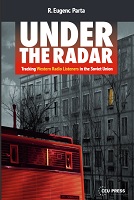Under the Radar
Tracking Western Radio Listeners in the Soviet Union
Author(s)
Parta, R. Eugene
Collection
Knowledge Unlatched (KU)Language
EnglishAbstract
Western democracy is currently under attack by a resurgent Russia, weaponizing new technologies and social media. How to respond? During the Cold War, the West fought off similar Soviet propaganda assaults with shortwave radio broadcasts. Founded in 1949, the US-funded Radio Free Europe/Radio Liberty broadcast uncensored information to the Soviet republics in their own languages. About one-third of Soviet urban adults listened to Western radio. The broadcasts played a key role in ending the Cold War and eroding the communist empire.
R. Eugene Parta was for many years the director of Soviet Area Audience Research at RFE/RL, charged among others with gathering listener feedback. In this book he relates a remarkable Cold War operation to assess the impact of Western radio broadcasts on Soviet listeners by using a novel survey research approach. Given the impossibility of interviewing Soviet citizens in their own country, it pioneered audacious interview methods in order to fly under the radar and talk to Soviets traveling abroad, ultimately creating a database of 51,000 interviews which offered unparalleled insights into the media habits and mindset of the Soviet public. By recounting how the “impossible” mission was carried out, Under the Radar also shows how the lessons of the past can help counter the threat from a once and current adversary.
Keywords
Communism; data gathering; USSR; public opinionDOI
10.7829/9789633864562ISBN
9789633864555, 9789633864562Publisher
Central European University PressPublisher website
http://ceupress.com/Publication date and place
2022Classification
Cold wars and proxy conflicts
Media studies


 Download
Download